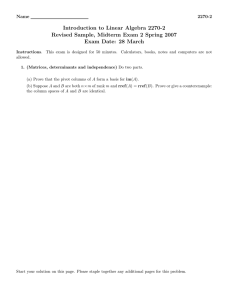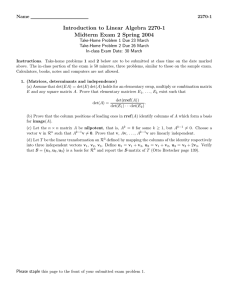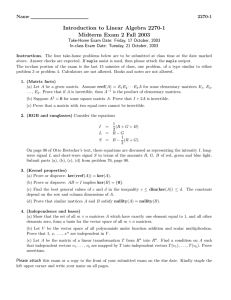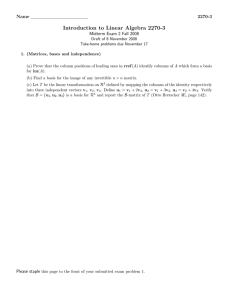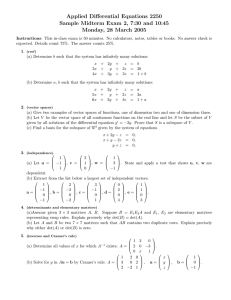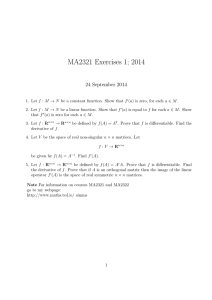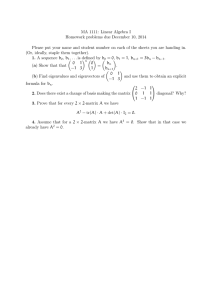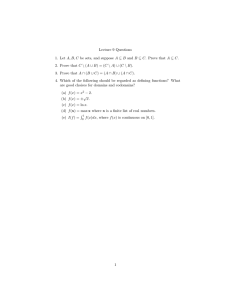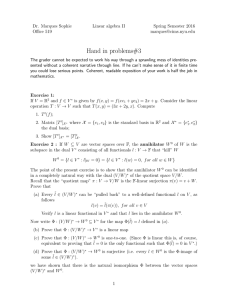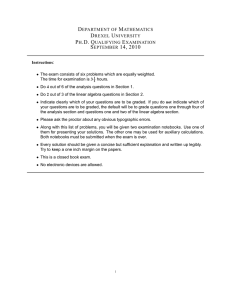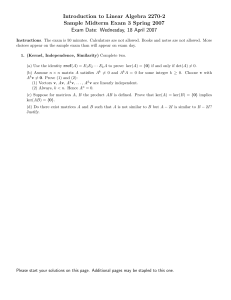Introduction to Linear Algebra 2270-2 Sample Midterm Exam 2 Spring 2007 Name
advertisement
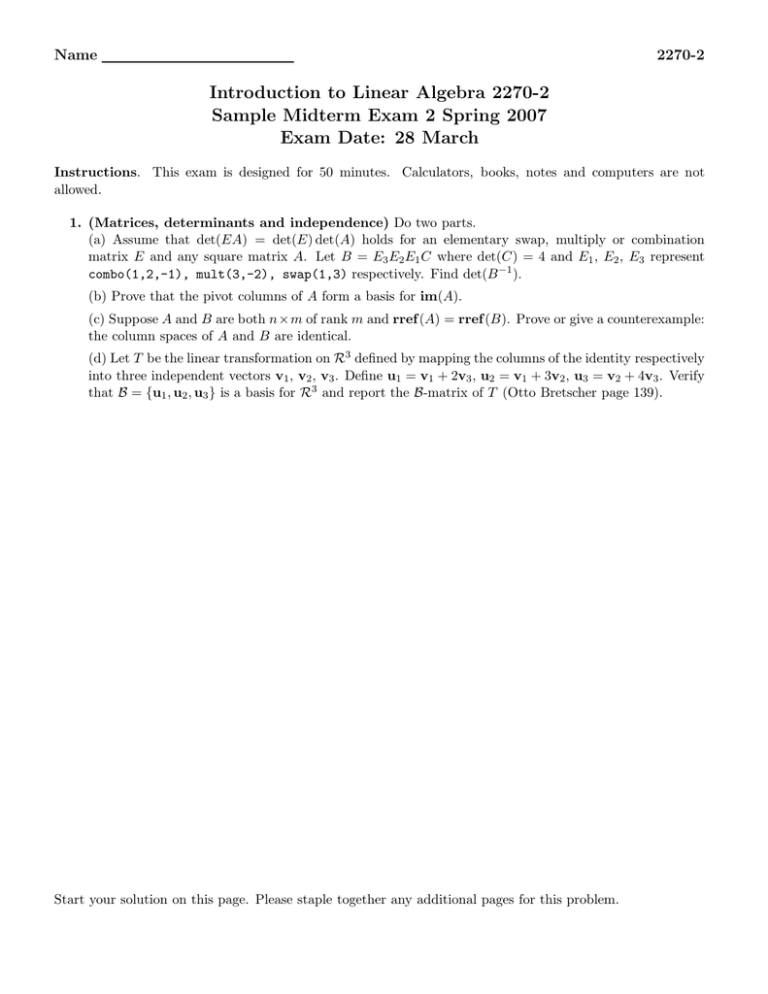
Name
2270-2
Introduction to Linear Algebra 2270-2
Sample Midterm Exam 2 Spring 2007
Exam Date: 28 March
Instructions. This exam is designed for 50 minutes. Calculators, books, notes and computers are not
allowed.
1. (Matrices, determinants and independence) Do two parts.
(a) Assume that det(EA) = det(E) det(A) holds for an elementary swap, multiply or combination
matrix E and any square matrix A. Let B = E3 E2 E1 C where det(C) = 4 and E1 , E2 , E3 represent
combo(1,2,-1), mult(3,-2), swap(1,3) respectively. Find det(B −1 ).
(b) Prove that the pivot columns of A form a basis for im(A).
(c) Suppose A and B are both n×m of rank m and rref (A) = rref (B). Prove or give a counterexample:
the column spaces of A and B are identical.
(d) Let T be the linear transformation on R3 defined by mapping the columns of the identity respectively
into three independent vectors v1 , v2 , v3 . Define u1 = v1 + 2v3 , u2 = v1 + 3v2 , u3 = v2 + 4v3 . Verify
that B = {u1 , u2 , u3 } is a basis for R3 and report the B-matrix of T (Otto Bretscher page 139).
Start your solution on this page. Please staple together any additional pages for this problem.
Name
2270-2
2. (Kernel and similarity) Do two parts.
(a) Illustrate the relation rref (A) = Ek · · · E2 E1 A by a frame sequence and explicit elementary matrices
for the matrix
0 1 2
A = 1 1 0 .
2 2 0
(b) Prove or disprove: ker(rref (BA)) = ker(A), for all invertible matrices B.
(c) Find a matrix A of size 3 × 3 that is not similar to a diagonal matrix. Verify assertions.
(d) Let
A=
1
1
0
0
1
1
0
0
1
1
1
0
1
1
1
1
and T =
0
0
0
0
Prove or disprove: A is similar to the upper triangular matrix T .
0
2
0
0
0
0
1
0
0
0
1
1
.
Start your solution on this page. Please staple together any additional pages for this problem.
Name
2270-2
3. (Independence and bases) Do two parts.
(a) Let A be a 12 × 15 matrix. Suppose that, for any possible independent set v1 , . . . , vk , the set Av1 ,
. . . , Avk is independent. Prove or give a counterexample: ker(A) = {0}.
(b) Let V be the vector space of all polynomials c0 + c1 x + c2 x2 under function addition and scalar
multiplication. Prove that 1 − x, 2x, (x − 1)2 form a basis of V .
Start your solution on this page. Please staple together any additional pages for this problem.
Name
2270-2
4. (Linear transformations) Do two parts.
(a) Let L be a line through the origin in R3 with unit direction u. Let T be a reflection through L.
Define T precisely. Display its representation matrix A, i.e., T (x) = Ax.
(b) Let T be a linear transformation from Rn into Rm . Let v1 , . . . , vn be the columns of I and let A
be the matrix whose columns are T (v1 ), . . . , T (vn ). Prove that T (x) = Ax.
Start your solution on this page. Please staple together any additional pages for this problem.
Name
2270-2
5. (Vector spaces)
(a) Show that the set of all 4 × 3 matrices A which have exactly one element equal to 1, and all other
elements zero, form a basis for the vector space of all 4 × 3 matrices.
(b) Let S = {
a b
−a 2b
!
: a, b real}. Find a basis for S.
(c) Let V be the vector space of all functions defined on the real line, using the usual definitions of
function addition and scalar multiplication. Let S be the set of all polynomials of degree less than 5
(e.g., x4 ∈ V but x5 ∈
/ V ) that have zero constant term. Prove that S is a subspace of V .
Start your solution on this page. Please staple together any additional pages for this problem.
